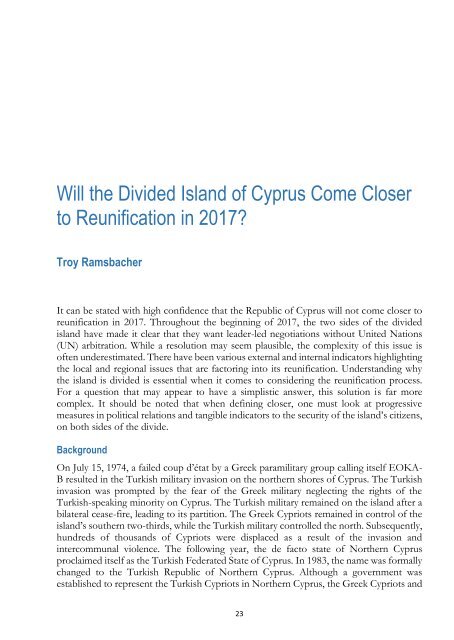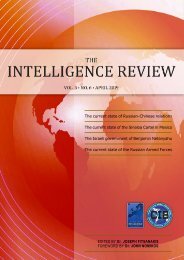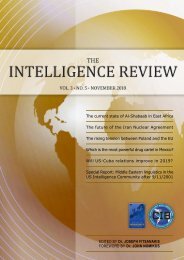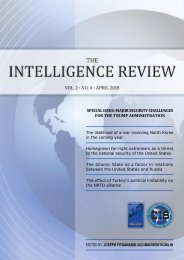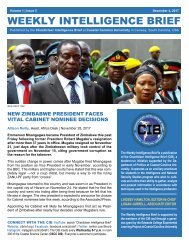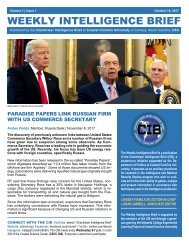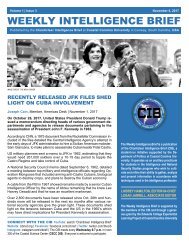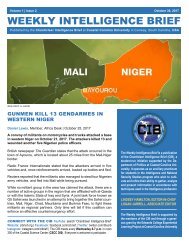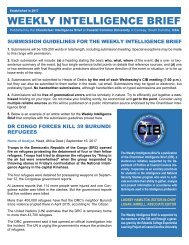The Intelligence Review | volume 2 | issue 3 |
This volume is the product of a collaboration between the European Intelligence Academy (EIA) and the Chanticleer Intelligence Brief (CIB), a student-run initiative supported by the Department of Politics at Coastal Carolina University in Conway, South Carolina, United States. Eight CIB analysts tackle some of the most pressing and timely questions confronting intelligence observers today. Topics in this volume include the current and projected strength of the Islamic State in Libya, the status of unification efforts on the island of Cyprus, the future of the government in Venezuela, and the United States’ place in the Paris climate agreement. There are also papers examining the construction of energy pipelines in Central Asia, as well as aspects of Iranian geopolitics in relation to the United States. Last, though certainly not least, we have included an estimative intelligence analysis of the first round of this year’s presidential elections in France. It refers to an event of global significance that has already taken place. However, it is included in this volume as an illustration of the power of intellectual accuracy and the ability of an intelligence analyst to achieve 100 percent accuracy —as this analyst does— by methodically considering and evaluating the analytical parameters of her question with the right balance of precision and intuition.
This volume is the product of a collaboration between the European Intelligence Academy (EIA) and the Chanticleer Intelligence Brief (CIB), a student-run initiative supported by the Department of Politics at Coastal Carolina University in Conway, South Carolina, United States. Eight CIB analysts tackle some of the most pressing and timely questions confronting intelligence observers today.
Topics in this volume include the current and projected strength of the Islamic State in Libya, the status of unification efforts on the island of Cyprus, the future of the government in Venezuela, and the United States’ place in the Paris climate agreement. There are also papers examining the construction of energy pipelines in Central Asia, as well as aspects of Iranian geopolitics in relation to the United States. Last, though certainly not least, we have included an estimative intelligence analysis of the first round of this year’s presidential elections in France. It refers to an event of global significance that has already taken place. However, it is included in this volume as an illustration of the power of intellectual accuracy and the ability of an intelligence analyst to achieve 100 percent accuracy —as this analyst does— by methodically considering and evaluating the analytical parameters of her question with the right balance of precision and intuition.
Create successful ePaper yourself
Turn your PDF publications into a flip-book with our unique Google optimized e-Paper software.
Will the Divided Island of Cyprus Come Closer<br />
to Reunification in 2017?<br />
Troy Ramsbacher<br />
It can be stated with high confidence that the Republic of Cyprus will not come closer to<br />
reunification in 2017. Throughout the beginning of 2017, the two sides of the divided<br />
island have made it clear that they want leader-led negotiations without United Nations<br />
(UN) arbitration. While a resolution may seem plausible, the complexity of this <strong>issue</strong> is<br />
often underestimated. <strong>The</strong>re have been various external and internal indicators highlighting<br />
the local and regional <strong>issue</strong>s that are factoring into its reunification. Understanding why<br />
the island is divided is essential when it comes to considering the reunification process.<br />
For a question that may appear to have a simplistic answer, this solution is far more<br />
complex. It should be noted that when defining closer, one must look at progressive<br />
measures in political relations and tangible indicators to the security of the island’s citizens,<br />
on both sides of the divide.<br />
Background<br />
On July 15, 1974, a failed coup d’état by a Greek paramilitary group calling itself EOKA-<br />
B resulted in the Turkish military invasion on the northern shores of Cyprus. <strong>The</strong> Turkish<br />
invasion was prompted by the fear of the Greek military neglecting the rights of the<br />
Turkish-speaking minority on Cyprus. <strong>The</strong> Turkish military remained on the island after a<br />
bilateral cease-fire, leading to its partition. <strong>The</strong> Greek Cypriots remained in control of the<br />
island’s southern two-thirds, while the Turkish military controlled the north. Subsequently,<br />
hundreds of thousands of Cypriots were displaced as a result of the invasion and<br />
intercommunal violence. <strong>The</strong> following year, the de facto state of Northern Cyprus<br />
proclaimed itself as the Turkish Federated State of Cyprus. In 1983, the name was formally<br />
changed to the Turkish Republic of Northern Cyprus. Although a government was<br />
established to represent the Turkish Cypriots in Northern Cyprus, the Greek Cypriots and<br />
23


